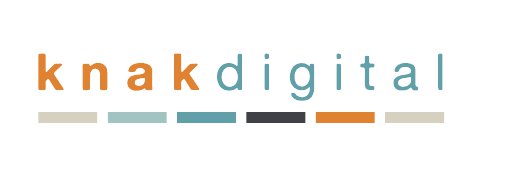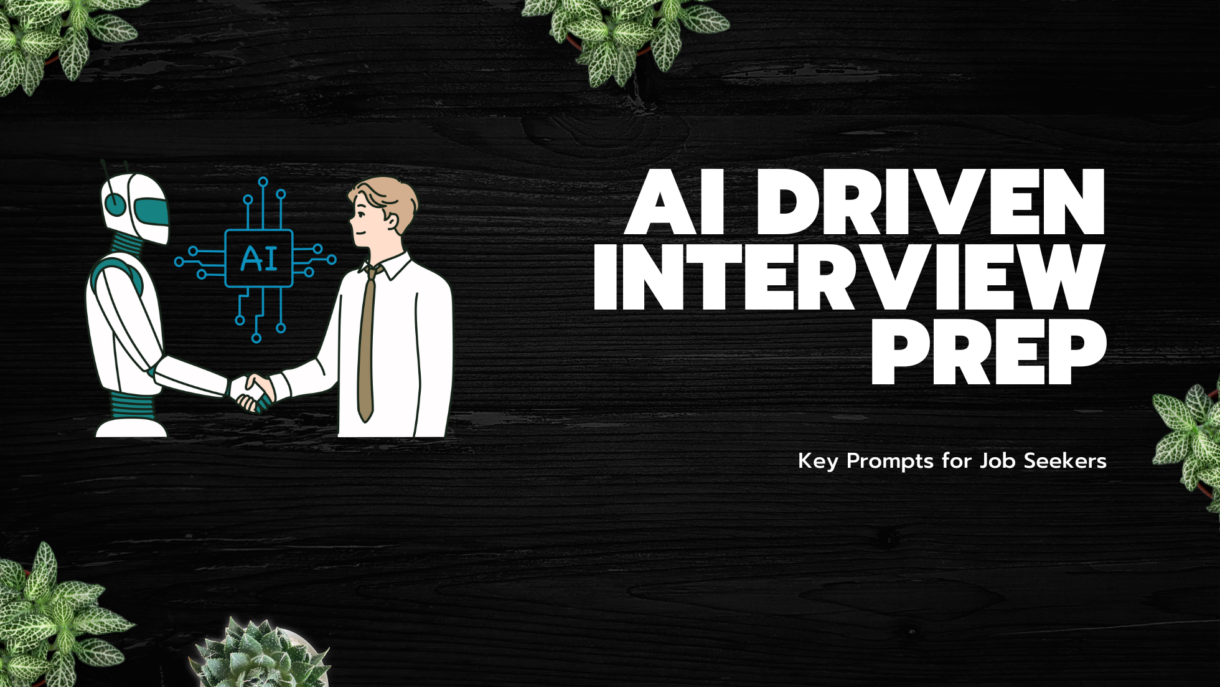Did you recently lock down an interview? If so, congratulations! This is where you transform those resume bullet points into compelling stories and validate why that referral recommended you. Get ready to show them exactly why you’re the right fit.
While there isn’t a fixed amount of hours one should dedicate to prep for an interview, there is no doubt that a comprehensive prep will result in better delivery and self-confidence. And it wouldn’t be 2025 unless we were talking about how generative AI can be a helpful agent to help you prepare for your interview.
Let’s review what prompts you can use to help assist you in your interview preparation.
Analyzing Job Descriptions Prompt
If you have access to the job description you are interviewing for, you can copy and paste elements to estimate what questions could be asked specific to that job.
Prompt: “Analyze this job description for a [position title]: [paste JD here]. Identify:
- Key responsibilities and skills
- Likely interview questions based on these requirements
- Technical concepts I should be prepared to discuss
- Potential challenges in this role”
Creating STAR Stories Prompt
Prepare for behavioral interview questions by reflecting on challenges and achievements from your entire work history. A well-crafted story can address multiple questions effectively.
Utilize the STAR (Situation, Task, Action, Result) or SOAR (Situation, Obstacle, Action, Result) method to structure your responses. For an extra impact, conclude by explaining what you learned and how it relates to the original question.
Develop stories for each of these common scenarios:
Notable Achievement: A significant accomplishment you’re proud of
Problem Solving: A time when you resolved an issue or saved the day
Collaboration: An instance of effective teamwork and supporting colleagues
Leadership: A situation where you took charge and led
Conflict Resolution: How you managed working with a difficult coworker
Learning from Failure: An experience of failure and its lessons
Overcoming Obstacles: A major challenge or tough decision you faced.
Once you have determined your main talking points around each letter of the STAR acronym, use a prompt to help with formatting.
Prompt: “Help me format this experience into a STAR story: Situation: [brief description of challenge/context] Task: [what needed to be done] Action: [what you did] Result: [outcome]
Format this into a compelling 2-minute interview response highlighting quantifiable results and key skills used.”
Role-Specific Questions Prompt
This approach is similar to the initial prompt but allows for more targeted question generation. For instance, if the position is technical in nature, you can direct the AI to focus on technical questions.
Prompt: “Create 10 likely (choose from the list below) interview questions for a [position] role at a [company type/size]. Focus on these key skills and requirements from the job description: [list 3-5 critical skills or qualifications]. Include suggested answer frameworks.
Types of questions can include behavioral, hard-skill, soft-skill, or technical. This will depend on the type of job.
The answer frameworks may include STAR, like above, for behavioral questions. When available, try to include a prior example of results. (You may need to work that into the prompt above BUT include the results in your prompt, such as “Include suggested answer frameworks with results.”)
Sample Prompt: For each question:
- Provide the question
- Explain why this question is relevant to the role
- Offer a suggested answer framework (e.g., STAR method, technical explanation structure)
- Include 1-2 follow-up questions an interviewer might ask
Company Research Prompt
Some generative AI tools are better than others for market research. Test whatever tools you have available to you and compare outputs.
Prompt: “Based on [company name]’s public information, what can you tell me about:
- Company Overview:
- What is the company’s main business and industry?
- When was the company founded and by whom?
- What is the company’s mission statement and core values?
- Financial Health Information:
- What are the company’s key financial metrics (revenue, profit, growth rate)?
- How has the company’s stock performed over time?
- What is the company’s market capitalization?
- Products and Services:
- What are the company’s main products or services?
- Who are the target customers for these offerings?
- How do the company’s products compare to competitors?
- Do I have access to demo the product?
- Market Position:
- Who are the company’s main competitors?
- What is the company’s market share in its industry?
- What are the company’s competitive advantages? disadvantages?
- Leadership and Management:
- Who are the executives and board members?
- What is the background and experience of the CEO?
- What is the background and experience of (hiring team)?
- How has the leadership team changed recently?
- Company Culture:
- What is the company’s approach to employee satisfaction and retention?
- How does the company handle diversity and inclusion?
- What are common employee reviews saying about the work environment?
- Innovation and Technology:
- What recent innovations or patents has the company developed?
- How is the company leveraging new technologies like AI or blockchain?
- What is the company’s R&D investment and focus?
- Has the company won new work or projects?
- Corporate Social Responsibility:
- What are the company’s sustainability initiatives?
- How does the company engage in community outreach or philanthropy?
- What is the company’s stance on environmental issues?
- Future Outlook:
- What are the company’s growth plans or expansion strategies?
- Are there any upcoming product launches or market entries?
- What challenges or opportunities does the company face in the near future?
- Legal and Regulatory Issues:
- Are there any ongoing legal disputes or regulatory challenges?
- How does the company comply with industry regulations?
- What potential regulatory changes could impact the company?
- Recent News & Developments:
- What major announcements or changes occurred in the last 6 months?
- Which media outlets frequently cover this company?
- What analyst predictions exist for the company?
- Work Environment:
- What benefits and perks are highlighted?
- How do they handle remote/hybrid work?
- What career development opportunities exist? Can you identify any press releases of employees who were recently promoted?
- Industry Trends:
- How is the company adapting to industry changes?
- What market trends affect their business model?
- Who are their strategic partners?
- Customer Insights:
- What do customer reviews reveal?
- How do they handle customer service?
- What’s their brand reputation?
- Growth & Acquisition History:
- What companies have they acquired?
- Which markets have they recently entered?
- What’s their expansion strategy?
- Digital Presence:
- How do they use social media? What social media channels do they use?
- What’s their online marketing strategy?
- How modern is their tech stack?
- Crisis Management:
- How did they handle past challenges?
- What’s their disaster recovery plan?
- How do they communicate during problems?
“Do you have any Questions for me?”
Using your research on AI and the company, you can formulate insightful questions for the interviewer that demonstrate your knowledge and interest.
Prompt: Based on the information I discovered about [Company Name], please generate 20 thoughtful and insightful questions I can ask the interviewer. Include a mix of questions about: (see list below)
I highly encourage you to include the topics that are important to you here, but to list a few ideas:
- The specific role I’m applying for
- The team structure and dynamics
- The company’s culture and values
- Recent projects or initiatives
- The company’s future plans and growth strategies
- Challenges the company or team is currently facing
- Opportunities for professional development and learning
- The company’s approach to work-life balance and remote work
Identify Skill Gaps
This step would be helpful if you are cold applying to jobs, as it allows you to make adjustments to your resume to include any relevant experience that may have been overlooked but is required for the position.
Prompt: “Please analyze my resume and the job description provided below. Identify any skill gaps between my qualifications and the job requirements. Create a table with three columns: 1) Skills required in the job description, 2) My current skills from the resume, and 3) Skill gaps or areas for improvement. Rank each skill gap from 1 (minor) to 5 (significant). Provide brief suggestions for addressing the most critical gaps.[Paste your resume here][Paste the job description here]”
Anticipate any Technical Questions
I would not encourage anyone to use generative AI during a live interview, but you can test out prompts as a research assistant for any tech questions relevant to the role.
Prompt: What are common technical interview questions that I should prepare for this job (insert job description).
Or you can even ask for what AI prompts you can feedback for the role:
Prompt: If I am interviewing for a Front End Engineer position with the tech stack of Javascript, Reach and Redux, what AI prompts can I use to prepare for any technical screening tests?
Once you have determined how you will answer these questions, enter your answer back into generative AI and ask if it should be refined.
AI Mock Interview Tools
There are specialized AI interview tools that not only offer text-based guidance on how to answer interview questions but also feature interactive simulations that mimic real interview scenarios. Some of these tools provide instant feedback, allowing you to make adjustments and enhance your performance.
A few to check out:
- PassMyInterview.com
- Interview Warmup
- Mock AI
- LeetCode Wizard
- Interview School
- Offer Goose
- Interviewing.IO
- Career IO
- Final Round AI
- Huru (paid app)
Interview prep can be intimidating. While generative AI tools can be helpful to anticipate, generate, and improve your interactions during an interview, they can’t replace the real delivery when it’s interview time. AI tools are an assistant, but not a replacement for selling your strengths to an interviewer. Happy prepping!
- From Federal to Private: Rebranding Your Government experience for Commercial Success
- Are Reference Checks Useless? Rethinking Their Value in Hiring
- The Critical Role of Peer Interviews in the Hiring Process
- Hiring Dilemma: Should you Choose the First Candidate you Interview?
- Scammers are Targeting Job Seekers–Here’s How to Outsmart them

